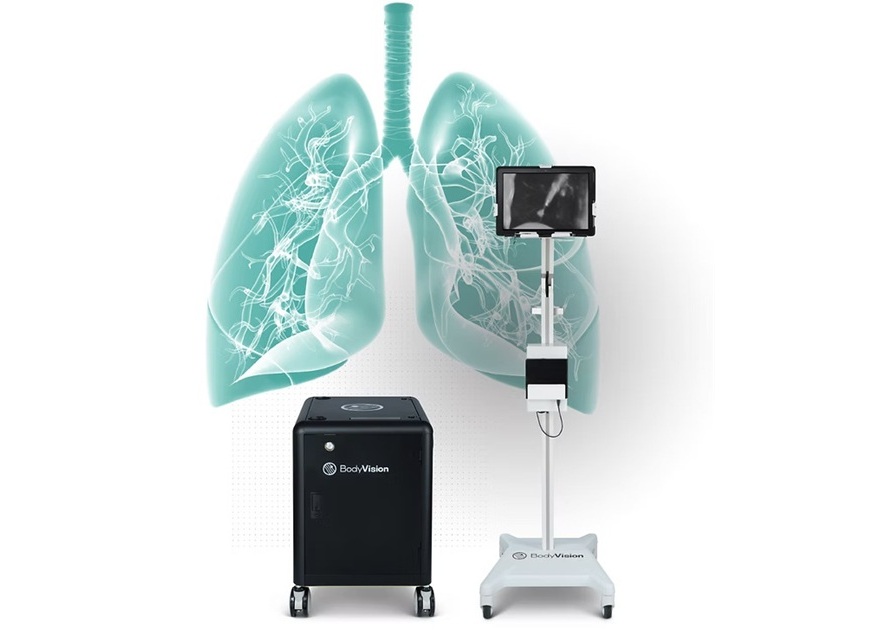Radiotherapy Increases Complications in Reconstructed Breasts
|
By MedImaging International staff writers Posted on 12 Jan 2017 |

Image: A new study claims that radiation therapy (RT) may increase complications in breast cancer patients who received implants, but not in those who underwent autologous reconstruction (Photo courtesy of the University of Michigan).
Researchers at the University of Michigan conducted a prospective, multicenter cohort study in which they collected medical data and patient-reported outcomes data from 553 RT patients and 1,461 patients who did not receive RT. About 38% and 25 % of the patients who did and did not receive RT, respectively, received autologous reconstruction, with the rest receiving implant reconstruction. Main outcomes and measures were complications following breast reconstruction, and satisfaction based on the BREAST-Q patient-reported outcome instrument.
The results showed that after one year of follow-up, 28.8% of those receiving RT and 22.3% of those who did not had at least one complication. After two years of follow-up, 34.1% of the patients who received RT and 22.5% of those who did not experienced reconstruction-related complications. Upon analysis, RT was associated with more than double the odds of developing complications in patients who received implants, but was not associated with complications in those who received autologous reconstruction.
In addition, based on BREAST-Q scores, patient-reported satisfaction was significantly lower in those who received RT versus those who did not receive RT among patients who received implants, but no such differences were found among the patients who received autologous reconstruction. The researchers cautioned, however, that a limitation of the study is that it is observational, and does not establish cause-effect relationship. The study was presented at the San Antonio Breast Cancer Symposium, held during December 2016.
“Because many women who undergo mastectomy become long-term survivors, breast reconstruction can have a lasting impact on quality of life,” said lead author and study presenter Professor Reshma Jagsi, MD, PhD, of the department of radiation oncology. “Those who plan to pursue autologous reconstruction and are debating whether or not to receive radiotherapy may derive some reassurance from the current study findings that outcomes among patients receiving autologous reconstruction did not appear substantially worse than those of unirradiated patients by two years.”
The results showed that after one year of follow-up, 28.8% of those receiving RT and 22.3% of those who did not had at least one complication. After two years of follow-up, 34.1% of the patients who received RT and 22.5% of those who did not experienced reconstruction-related complications. Upon analysis, RT was associated with more than double the odds of developing complications in patients who received implants, but was not associated with complications in those who received autologous reconstruction.
In addition, based on BREAST-Q scores, patient-reported satisfaction was significantly lower in those who received RT versus those who did not receive RT among patients who received implants, but no such differences were found among the patients who received autologous reconstruction. The researchers cautioned, however, that a limitation of the study is that it is observational, and does not establish cause-effect relationship. The study was presented at the San Antonio Breast Cancer Symposium, held during December 2016.
“Because many women who undergo mastectomy become long-term survivors, breast reconstruction can have a lasting impact on quality of life,” said lead author and study presenter Professor Reshma Jagsi, MD, PhD, of the department of radiation oncology. “Those who plan to pursue autologous reconstruction and are debating whether or not to receive radiotherapy may derive some reassurance from the current study findings that outcomes among patients receiving autologous reconstruction did not appear substantially worse than those of unirradiated patients by two years.”
Latest Nuclear Medicine News
- Novel PET Imaging Approach Offers Never-Before-Seen View of Neuroinflammation
- Novel Radiotracer Identifies Biomarker for Triple-Negative Breast Cancer
- Innovative PET Imaging Technique to Help Diagnose Neurodegeneration
- New Molecular Imaging Test to Improve Lung Cancer Diagnosis
- Novel PET Technique Visualizes Spinal Cord Injuries to Predict Recovery
- Next-Gen Tau Radiotracers Outperform FDA-Approved Imaging Agents in Detecting Alzheimer’s
- Breakthrough Method Detects Inflammation in Body Using PET Imaging
- Advanced Imaging Reveals Hidden Metastases in High-Risk Prostate Cancer Patients
- Combining Advanced Imaging Technologies Offers Breakthrough in Glioblastoma Treatment
- New Molecular Imaging Agent Accurately Identifies Crucial Cancer Biomarker
- New Scans Light Up Aggressive Tumors for Better Treatment
- AI Stroke Brain Scan Readings Twice as Accurate as Current Method
- AI Analysis of PET/CT Images Predicts Side Effects of Immunotherapy in Lung Cancer
- New Imaging Agent to Drive Step-Change for Brain Cancer Imaging
- Portable PET Scanner to Detect Earliest Stages of Alzheimer’s Disease
- New Immuno-PET Imaging Technique Identifies Glioblastoma Patients Who Would Benefit from Immunotherapy
Channels
Radiography
view channel
AI-Powered Imaging Technique Shows Promise in Evaluating Patients for PCI
Percutaneous coronary intervention (PCI), also known as coronary angioplasty, is a minimally invasive procedure where small metal tubes called stents are inserted into partially blocked coronary arteries... Read more
Higher Chest X-Ray Usage Catches Lung Cancer Earlier and Improves Survival
Lung cancer continues to be the leading cause of cancer-related deaths worldwide. While advanced technologies like CT scanners play a crucial role in detecting lung cancer, more accessible and affordable... Read moreMRI
view channel
Ultra-Powerful MRI Scans Enable Life-Changing Surgery in Treatment-Resistant Epileptic Patients
Approximately 360,000 individuals in the UK suffer from focal epilepsy, a condition in which seizures spread from one part of the brain. Around a third of these patients experience persistent seizures... Read more
AI-Powered MRI Technology Improves Parkinson’s Diagnoses
Current research shows that the accuracy of diagnosing Parkinson’s disease typically ranges from 55% to 78% within the first five years of assessment. This is partly due to the similarities shared by Parkinson’s... Read more
Biparametric MRI Combined with AI Enhances Detection of Clinically Significant Prostate Cancer
Artificial intelligence (AI) technologies are transforming the way medical images are analyzed, offering unprecedented capabilities in quantitatively extracting features that go beyond traditional visual... Read more
First-Of-Its-Kind AI-Driven Brain Imaging Platform to Better Guide Stroke Treatment Options
Each year, approximately 800,000 people in the U.S. experience strokes, with marginalized and minoritized groups being disproportionately affected. Strokes vary in terms of size and location within the... Read moreUltrasound
view channel
Smart Ultrasound-Activated Immune Cells Destroy Cancer Cells for Extended Periods
Chimeric antigen receptor (CAR) T-cell therapy has emerged as a highly promising cancer treatment, especially for bloodborne cancers like leukemia. This highly personalized therapy involves extracting... Read more
Tiny Magnetic Robot Takes 3D Scans from Deep Within Body
Colorectal cancer ranks as one of the leading causes of cancer-related mortality worldwide. However, when detected early, it is highly treatable. Now, a new minimally invasive technique could significantly... Read more
High Resolution Ultrasound Speeds Up Prostate Cancer Diagnosis
Each year, approximately one million prostate cancer biopsies are conducted across Europe, with similar numbers in the USA and around 100,000 in Canada. Most of these biopsies are performed using MRI images... Read more
World's First Wireless, Handheld, Whole-Body Ultrasound with Single PZT Transducer Makes Imaging More Accessible
Ultrasound devices play a vital role in the medical field, routinely used to examine the body's internal tissues and structures. While advancements have steadily improved ultrasound image quality and processing... Read moreGeneral/Advanced Imaging
view channel
AI-Powered Imaging System Improves Lung Cancer Diagnosis
Given the need to detect lung cancer at earlier stages, there is an increasing need for a definitive diagnostic pathway for patients with suspicious pulmonary nodules. However, obtaining tissue samples... Read more
AI Model Significantly Enhances Low-Dose CT Capabilities
Lung cancer remains one of the most challenging diseases, making early diagnosis vital for effective treatment. Fortunately, advancements in artificial intelligence (AI) are revolutionizing lung cancer... Read moreImaging IT
view channel
New Google Cloud Medical Imaging Suite Makes Imaging Healthcare Data More Accessible
Medical imaging is a critical tool used to diagnose patients, and there are billions of medical images scanned globally each year. Imaging data accounts for about 90% of all healthcare data1 and, until... Read more
Global AI in Medical Diagnostics Market to Be Driven by Demand for Image Recognition in Radiology
The global artificial intelligence (AI) in medical diagnostics market is expanding with early disease detection being one of its key applications and image recognition becoming a compelling consumer proposition... Read moreIndustry News
view channel
GE HealthCare and NVIDIA Collaboration to Reimagine Diagnostic Imaging
GE HealthCare (Chicago, IL, USA) has entered into a collaboration with NVIDIA (Santa Clara, CA, USA), expanding the existing relationship between the two companies to focus on pioneering innovation in... Read more
Patient-Specific 3D-Printed Phantoms Transform CT Imaging
New research has highlighted how anatomically precise, patient-specific 3D-printed phantoms are proving to be scalable, cost-effective, and efficient tools in the development of new CT scan algorithms... Read more
Siemens and Sectra Collaborate on Enhancing Radiology Workflows
Siemens Healthineers (Forchheim, Germany) and Sectra (Linköping, Sweden) have entered into a collaboration aimed at enhancing radiologists' diagnostic capabilities and, in turn, improving patient care... Read more

















